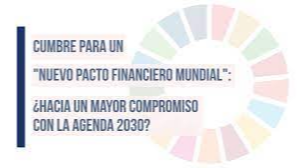
By Maritza Gutiérrez
A hundred countries, half of them represented by their heads of state or government, will meet this June 22 and 23 in Paris to work, according to their organizers, on a "real transformation of the international financial system", which dates back to the mid-20th century.
It is worth recalling that in November 2022, on the occasion of the G20 Summit and at the end of a COP27 with mixed results, Emmanuel Macron announced the organization of an international conference in Paris this year, with the aim of analyzing and elucidating the adoption "of all ways and means to increase financial solidarity with the global South".
However, this announcement came in a complex international context: on the one hand, the climate crisis, which threatens island states in particular, prompted an initiative by the Prime Minister of Barbados, Mia Mottley, for climate action financing, also called the "Bridgetown Initiative", which aims to facilitate access to international financing for the countries most vulnerable to climate change.
While President Macron's announcement is in line with the Bridgetown initiative, the Summit in Paris aims to propose solutions to financing problems that go beyond the climate issue, such as access to healthcare and the fight against poverty, following the complex post-cooling scenario, the war in Ukraine and its consequences.
As a result, many countries lost their capacity to finance their populations' access to basic social services. In this regard, the UNDP confirmed a decline in human development in nine out of ten countries in the world, mainly due to the decrease in life expectancy and the increase in poverty.
The organizers also announced four major objectives to be addressed by four working groups: to provide financing and fiscal space in countries with short-term difficulties, especially the most indebted; to encourage private sector development in low-income countries; to promote investment in "green" infrastructure for energy transition in emerging and developing countries; and to mobilize innovative financing for the countries most vulnerable to climate change.
One thing that seems to distinguish the proposal is that the organizers have expressed interest in possible contributions from civil society and private sector actors.
Some 100 countries will attend the Summit, half of them represented by their Heads of State or Government; Antonio Guterres, Secretary General of the United Nations, and Ursula Von der Leyen, President of the European Commission, will also be present, as well as other high-level representatives of international organizations.

